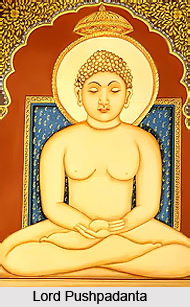 According to Jain philosophy, Pushpadanta was the Ninth Tirthankara among the twenty-four Jain Tirthankars. He is also known by the name Suvidhinath. Pushpadanta became a siddha, a liberated soul that has destroyed all of its karma.
According to Jain philosophy, Pushpadanta was the Ninth Tirthankara among the twenty-four Jain Tirthankars. He is also known by the name Suvidhinath. Pushpadanta became a siddha, a liberated soul that has destroyed all of its karma.
Lord Pushpadanta was born to Sugriva of Kakandi and Rama Devi in the Ikshvaku dynasty. He was born on the fifth day of the Margashirsha Krishna month of the Hindu calendar. In the tradition started by Bhagavan Rishabhdev the ninth Tirthankara re-established the four pronged religious ford was Bhagavan Suvidhinath. During his earlier incarnation as emperor Mahapadma of Pushkalvati Vijay purified his soul andf earned the Tirthankar-nam-and-gotra-karma.
Lord Pushpadanta took birth in the Vijayant dimension of gods. From the Vijayant dimension he descended into the womb of queen Rama Devi, wife of king Sugriva of Kakandi town.
Resurrection of Lord Pushpadanta
While Queen Rama was pregnant she experienced an extraordinary capability to develop processes for doing even the most difficult of tasks. Everyone got overwhelmed at her skill. When the child, Pushpadanta was born then Emperor, Sugriva named him as Suvidhi. During the teething period of the child the mother got a craving for playing with flowers. As such, he was also popularly known as Pushpadant or flower-tooth.
Pushpadant lead a normal princely life of luxury and pleasure but was always remained detached from them. He became an ascetic at an early age and attained omniscience only after four months rigorous spiritual practices. He achieved Nirvana at Sammetshikhar on the ninth day of the dark half of the month of Kartik.
The tradition of the four pronged religious ford started by Lord Rishabhdev steadily became extinct after the Nirvana of Lord Pushpadanta. After his death, first the ascetic organization disintegrated and a time came when there was no ascetic left. The religious discourses too were given by common citizens or Shravaks. Slowly the influence of wealth became overpowering and people sbegan forgetting the principals of five vows including Ahimsa and truthfulness. The discipline of spiritual principles gave way to ritualistic exchanges of wealth and total indiscipline.












